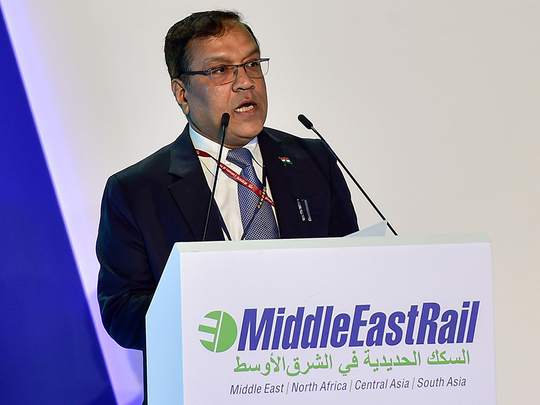
Dubai: India is to spend $140 billion (Dh514.22 billion) upgrading and expanding its railway network in “unprecedented reform”, Mahesh Kumar Gupta of the Indian Railway Board told the Middle East Rail conference on Monday.
Gupta said the network — the third largest in the world under one operator, with more than 65,000km of railway lines — had suffered an “accumulated backlog” of investment.
During 2017, he said, it carried 1.1 billion tonnes of freight and 8.1 billion passengers — making it the world’s largest passenger carrier and the fourth largest freight carrier.
“Indian Railway has always played a crucial role in connecting markets and moving the masses of the country at affordable rates.
“However, over the years, there has been erosion in the modal share of railways.”
Though large in terms of volume, he pointed out that India’s railway network carried only 30 per cent of the country’s freight, compared to 40 per cent in countries such as the US and China.
“This trend needs to be reversed both by economic and environmental reasons,” he said.
He said part of the problem was “crippling capacity constraints” to meet new demand.
As a result, the $132 billion allocated for railway improvements in the 2015-16 budget had been increased to $147 billion through government support, internal generation and from state governments.
“Such magnitude of work and investment in India Railways, besides posing new challenges, provides enormous business opportunities to the various players associated with railways and project financing,” he said.
Major projects
Indian Railway Board member Mahesh Kumar Gupta listed several major projects to upgrade India’s rail network
* $33 billion to tackle network congestion
* $32 billion to extend the network with 19,000km of new lines, including in Jammu and Kashmir and the North-East Region.
* $21 billion for replacing or upgrading fixed assets such as tracks, bridges and signalling systems.
* $17 billion for new rolling stock
* $15 billion for high-speed networks
* $17 billion to upgrade 700 stations and logistic support












